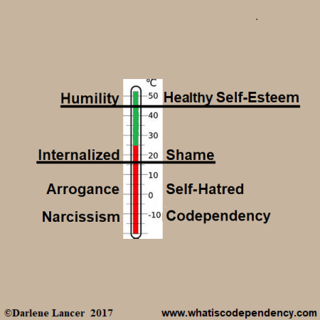Codependency
Narcissists Are Codependent, Too
Contrary to popular belief, narcissists show codependent symptoms.
Posted July 23, 2019 Reviewed by Kaja Perina

Narcissists (people with Narcissistic Personality Disorder) and codependents are usually considered opposites, but surprisingly, though their outward behavior may differ, they share many psychological traits. In fact, narcissists exhibit core codependent symptoms of shame, denial, control, dependency (unconscious), and dysfunctional communication and boundaries, which all lead to intimacy problems. One study showed a significant correlation between narcissism and codependency.[i] Although most narcissists can be classified as codependent, the reverse isn’t true – most codependents aren’t narcissists. They don’t exhibit common traits of exploitation, entitlement, and lack of empathy.
Dependency
Codependency is a disorder of a “lost self.” Codependents have lost their connection to their innate self. Instead, their thinking and behavior revolve around a person, substance, or process. Narcissists also suffer from a lack of connection to their true self. In its place, they’re identified with their ideal self. Their inner deprivation and lack of connection to their real self make them dependent on others for validation. Consequently, like other codependents, their self-image, thinking, and behavior are other-oriented in order to stabilize and validate their self-esteem and fragile ego.
Ironically, despite declared high self-regard, narcissists crave recognition from others and have an insatiable need to be admired – to get their “narcissistic supply.” This makes them as dependent on recognition from others as an addict is on their addiction.
Shame
Shame is at the core of codependency and addiction. It stems from growing up in a dysfunctional family. Narcissists’ inflated self-opinion is commonly mistaken for self-love. However, exaggerated self-flattery and arrogance merely assuage unconscious, internalized shame that is common among codependents.
Children develop different ways of coping with the anxiety, insecurity, and hostility that they experience growing up in dysfunctional families. Internalized shame can result despite parents’ good intentions and lack of overt abuse. To feel safe, children adopt coping patterns that give rise to an ideal self. One strategy is to accommodate other people and seek their love, affection, and approval. Another is to seek recognition, mastery, and domination over others. Stereotypical codependents fall into the first category, and narcissists the second. They seek power and control of their environment in order to get their needs met. Their pursuit of prestige, superiority, and power helps them avoid feeling inferior, vulnerable, needy, and helpless at all costs.
These ideals are natural human needs; however, for codependents and narcissists, they’re compulsive and thus neurotic. Additionally, we pursue our ideal self, the further we depart from our real self, which only increases our insecurity, false self, and sense of shame.
Denial
Denial is a core symptom of codependency. Codependents are generally in denial of their codependency and often their feelings and many of their needs. Similarly, narcissists deny feelings, particularly those that express vulnerability. They won’t admit to feelings of inadequacy, even to themselves. They disown and often project onto others feelings that they consider “weak,” such as longing, sadness, loneliness, shame, powerlessness, guilt, fear, and variations of them. Anger makes them feel powerful. Rage, arrogance, envy, and contempt are defenses to underlying shame.
Codependents deny their needs, especially emotional needs, which were neglected or shamed growing up. Some codependents act self-sufficient and readily put others' needs first. Other codependents are demanding of people to satisfy their needs. Narcissists also deny emotional needs. They won’t admit that they’re being demanding and needy because having needs makes them feel dependent and weak. Instead, they judge others as weak and needy. They're repelled by the very feelings they disown in themselves.
Although narcissists don’t usually put the needs of others first, some narcissists are actually people-pleasers and can be very generous. In addition to securing the attachment of those they depend on, often their motive is for recognition or to feel superior or grandiose by virtue of the fact that they’re able to aid people who they consider inferior. Like other codependents, they may feel exploited by and resentful toward the people they help.
Many narcissists hide behind a facade of self-sufficiency and aloofness when it comes to needs for emotional closeness, support, grieving, nurturing, and intimacy. Their quest for power protects them from experiencing the humiliation of feeling weak, sad, afraid, or wanting or needing anyone—ultimately, to avoid rejection and feeling shame. Only the threat of abandonment reveals how dependent they truly are.
Dysfunctional Boundaries
Like other codependents, narcissists have unhealthy boundaries, because theirs weren’t respected growing up. They don’t experience other people as separate but as extensions of themselves. As a result, they project thoughts and feelings onto others and blame them for their shortcomings and mistakes, all of which they cannot tolerate in themselves. Additionally, a lack of boundaries makes them thin-skinned, highly reactive, and defensive and causes them to take everything personally.
Most codependents share these patterns of blame, reactivity, defensiveness, and taking things personally. The behavior and degree or direction of feelings might vary, but the underlying process is similar. For example, many codependents react with self-criticism, self-blame, or withdrawal, while others react with aggression or criticism and blame someone else. Yet, both behaviors are reactions to shame and demonstrate dysfunctional boundaries. (In some cases, confrontation or withdrawal might be an appropriate response, but not if it’s a habitual, compulsive reaction.)
Dysfunctional Communication
Like other codependents, narcissists’ communication is dysfunctional. They generally lack assertiveness skills. Their communication often consists of criticism, demands, labeling, and other forms of verbal abuse. On the other hand, some narcissists intellectualize, obfuscate, and are indirect. Like other codependents, they find it difficult to identify and clearly state their feelings. Although they may express opinions and take positions more easily than other codependents, they frequently have trouble listening and are dogmatic and inflexible. These are signs of dysfunctional communication that evidence insecurity and lack of respect for the other person.
Control
Like other codependents, narcissists seek control. Control over our environment helps us to feel safe. The greater our anxiety and insecurity, the greater is our need for control. When we’re dependent on others for our security, happiness, and self-worth, what people think, say, and do become paramount to our sense of well-being and even safety. We’ll try to control them directly or indirectly with people-pleasing, lies, or manipulation. If we’re frightened or ashamed of our feelings, such as anger or grief, then we attempt to control our feelings. Other people’s anger or grief will upset us, so that they must be avoided or controlled, too.
Intimacy
Finally, the combination of all these patterns makes intimacy challenging for narcissists and codependents, alike. Relationships can’t thrive without clear boundaries that afford partners freedom and respect. They require that we’re autonomous, have assertive communication skills, and self-esteem.
For more about these patterns see my book Conquering Shame and Codependency.
©Darlene Lancer 2017
References
[i] Irwin, H. J. (1995) Codependence, Narcissism, and Childhood Trauma. Journal of Clinical Psychology 51:5.




